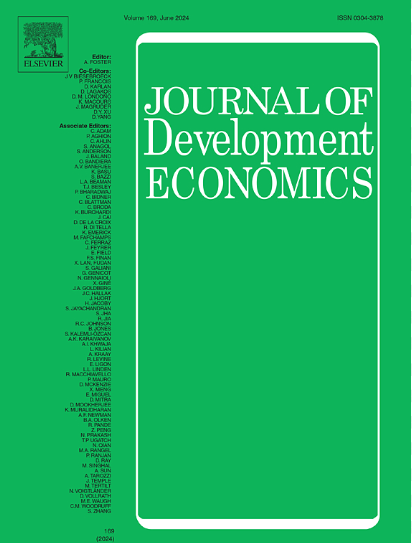The persistence of trade relocation from civil conflict
IF 5.1
1区 经济学
Q1 ECONOMICS
引用次数: 0
Abstract
This paper examines the lasting impact of civil conflicts on bilateral trade flows and the subsequent implications for economic recovery. Utilizing a novel estimation approach based on the structural gravity model of international trade, we demonstrate that importers shift their trade preferences away from exporters involved in civil conflicts. This effect persists even after the conflict has been resolved, as countries solidify their relocation decisions by reducing bilateral trade costs with alternative trading partners through Preferential Trade Agreements. Notably, the persistent trade relocation is more pronounced in the manufacturing sector, while it does not occur in the fuels sector. Our findings underscore the significance of supportive trade policies as effective tools for assisting nations in recovering from episodes of political violence. Furthermore, our estimation approach can be adapted to investigate the impacts of other unilateral shocks, such as natural disasters, or to analyze various bilateral dependent variables, including migration.
国内冲突造成的贸易迁移现象持续存在
本文探讨了国内冲突对双边贸易流动的持久影响以及随后对经济复苏的影响。利用基于国际贸易结构重力模型的新颖估算方法,我们证明了进口商会转移其贸易偏好,远离卷入国内冲突的出口商。这种效应甚至在冲突解决后依然存在,因为各国通过优惠贸易协定降低了与替代贸易伙伴的双边贸易成本,从而巩固了它们的迁移决策。值得注意的是,持续的贸易转移在制造业部门更为明显,而在燃料部门则没有发生。我们的研究结果表明,支持性贸易政策是帮助国家从政治暴力事件中恢复的有效工具。此外,我们的估算方法还可用于研究自然灾害等其他单边冲击的影响,或分析包括移民在内的各种双边因变量。
本文章由计算机程序翻译,如有差异,请以英文原文为准。
求助全文
约1分钟内获得全文
求助全文
来源期刊

Journal of Development Economics
ECONOMICS-
CiteScore
8.30
自引率
4.00%
发文量
126
审稿时长
72 days
期刊介绍:
The Journal of Development Economics publishes papers relating to all aspects of economic development - from immediate policy concerns to structural problems of underdevelopment. The emphasis is on quantitative or analytical work, which is relevant as well as intellectually stimulating.
 求助内容:
求助内容: 应助结果提醒方式:
应助结果提醒方式:


